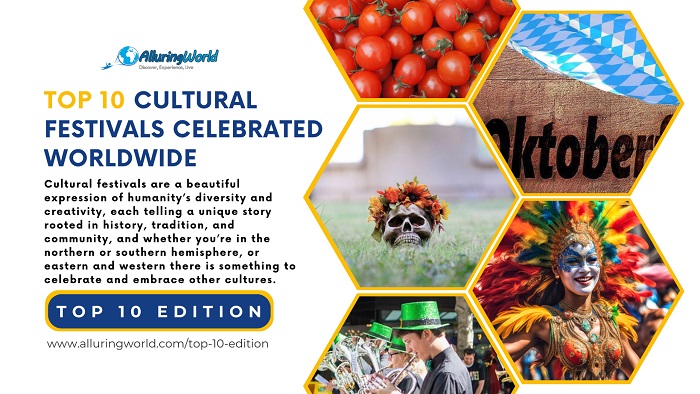Cultural festivals are vibrant celebrations that reflect the traditions, beliefs, and spirit of communities around the globe. They provide an opportunity to experience the rich diversity of cultures and share in moments of joy, reverence, and connection. From colorful parades to sacred rituals, these festivals attract people from all walks of life, offering a glimpse into the heart of different societies. Here are ten of the most remarkable cultural festivals celebrated worldwide that deserve to be visited and celebrated in 2026, each offering a unique experience of human expression and heritage:
1. Carnival (Rio de Janeiro, Brazil)
The Carnival in Rio de Janeiro is one of the world’s largest and most iconic festivals as it is celebrated annually before Lent, and it features dazzling parades with samba dancers in vibrant costumes, massive street parties, and music that fills the city for days. The festival showcases Brazilian culture, particularly samba, and draws millions of visitors from around the world.
2. Diwali (India)
Known as the Festival of Lights, Diwali is one of the most significant Hindu festivals, celebrated with immense joy across India and other parts of the world. The festival symbolizes the triumph of light over darkness and good over evil. Houses are adorned with oil lamps (diyas), fireworks light up the skies, and families exchange gifts and sweets during this five-day celebration.
3. Oktoberfest (Munich, Germany)
Oktoberfest is the world’s largest beer festival, held annually in Munich, Germany, where this lively event celebrates Bavarian culture with traditional music, folk dances, hearty food, and, of course, an abundance of beer. Attendees don lederhosen and dirndls as they gather in massive beer tents, making Oktoberfest a true celebration of German heritage and camaraderie.
4. Chinese New Year (China and Worldwide)
Chinese New Year, also known as the Spring Festival, marks the beginning of the lunar new year and is the most important traditional Chinese holiday. The festival is celebrated with dragon and lion dances, fireworks, family reunions, and the giving of red envelopes filled with money, and it is a time of renewal, honoring ancestors, and hoping for prosperity in the coming year.
5. Mardi Gras (New Orleans, USA)
Mardi Gras, or Fat Tuesday, is celebrated in New Orleans with grand parades, masquerade balls, and street parties leading up to Lent. Known for its colorful beads, elaborate costumes, and festive spirit, Mardi Gras blends French, Spanish, and African traditions and is a cornerstone of New Orleans’ cultural identity.
ADVERTISEMENT
6. Holi (India and Nepal)
Holi, the Festival of Colors, is a joyous Hindu celebration that marks the arrival of spring. During this festival, people gather in the streets to throw colored powders at each other, dance, and celebrate with music and traditional food. Holi symbolizes the victory of good over evil and the playful spirit of love and renewal.
7. La Tomatina (Buñol, Spain)
La Tomatina is a unique festival held annually in the town of Buñol, Spain, where participants engage in a massive tomato fight. Tens of thousands of people gather to hurl ripe tomatoes at each other in a fun and messy spectacle, and while its origins are unclear, La Tomatina has become a symbol of lighthearted, communal fun.
8. Day of the Dead (Mexico)
Día de los Muertos, or Day of the Dead, is a Mexican holiday that honors deceased loved ones. Celebrated with elaborate altars (ofrendas), colorful sugar skulls, marigolds, and family gatherings, it is both a solemn and festive occasion, and rather than mourning, the holiday is a joyful celebration of life, reflecting the belief that the dead return to join their families in spirit.
9. Edinburgh Festival Fringe (Edinburgh, Scotland)
The Edinburgh Festival Fringe is the largest arts festival in the world, featuring thousands of performances from theater, comedy, music, and dance to spoken word and visual arts. Held every August in Scotland’s capital, this open-access festival welcomes performers from around the globe, creating a dynamic and inclusive cultural celebration.
10. St. Patrick’s Day (Ireland and Worldwide)
St. Patrick’s Day is celebrated on 17th March to honor Ireland’s patron saint, St. Patrick. The festival is marked by parades, wearing green, and public festivities, with iconic landmarks around the world often illuminated in green lights, and Irish music, dance, and folklore take center stage, making St. Patrick’s Day a global celebration of Irish heritage and culture.
Cultural festivals are a beautiful expression of humanity’s diversity and creativity, each telling a unique story rooted in history, tradition, and community. Whether you’re witnessing the vibrant colors of Holi in India, the somber yet joyful celebrations of Día de los Muertos in Mexico, or the lively parades of Carnival in Brazil, these festivals offer an opportunity to connect with people from different parts of the world and experience the richness of their cultures. Attending these global festivals not only enhances our understanding of different traditions but also highlights the universal joy of celebration and togetherness.

